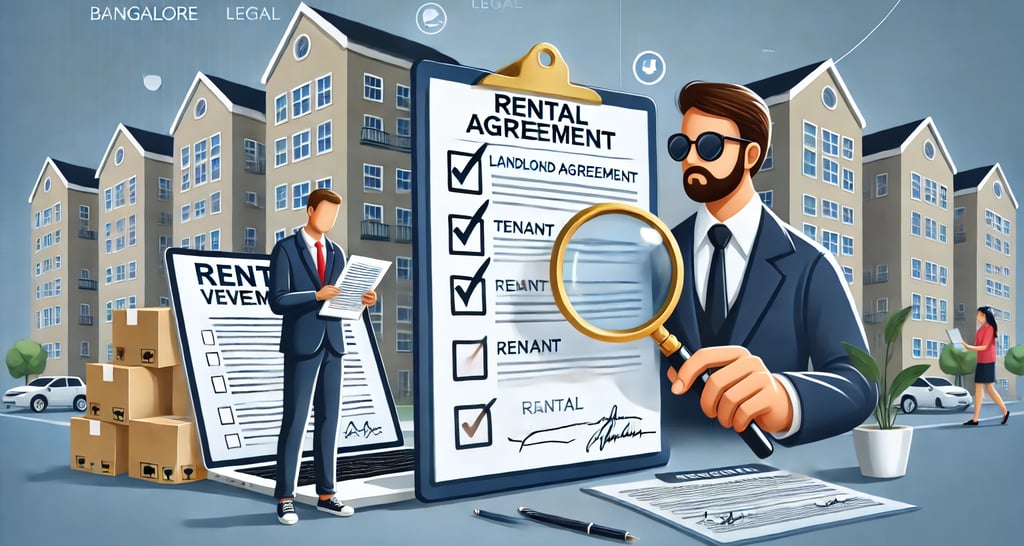Mistakes landlords should avoid when renting a property
Avoid common landlord mistakes in Bangalore! Learn how to verify tenants, draft agreements, set rent, and stay compliant with laws for a stress-free rental experience
Archita
3/22/20254 min read


Renting out a property can be a goldmine, but one misstep can turn it into a minefield."
Did you know that Bangalore has over 1.5 million rented households, making it one of India’s most active rental markets, according to a report? With its booming IT sector, vibrant culture, and cosmopolitan lifestyle, Bangalore attracts professionals and students from across the country. For landlords, this presents a golden opportunity to earn steady rental income. However, many landlords make avoidable mistakes that lead to financial losses, legal troubles, and unnecessary stress.
If you’re a landlord in Bangalore, this article is your guide to avoiding common pitfalls and ensuring a smooth renting experience. Let’s dive in!
Introduction: The Bangalore Rental Market – Opportunities and Challenges
Bangalore, often called the "Silicon Valley of India," is a city that never sleeps. Its thriving tech hubs, educational institutions, and cosmopolitan lifestyle make it a magnet for renters. From young professionals working in IT parks to students studying in prestigious colleges, the demand for rental properties in Bangalore is always high. However, being a landlord in this bustling city comes with its own set of challenges.
From drafting airtight rental agreements to handling tenant disputes, landlords need to be proactive and well-informed. Unfortunately, many make mistakes that can lead to financial losses, legal complications, and even damage to their property. Whether you’re a first-time landlord or a seasoned property owner, avoiding these common errors can save you time, money, and headaches.
1. Skipping Proper Tenant Verification
One of the biggest mistakes landlords make is not verifying their tenants thoroughly. Renting to the wrong person can lead to unpaid rent, property damage, and even legal battles.
Background Check: Always verify the tenant’s identity, employment, and rental history. Use tools like Aadhaar verification and employment proof.
Reference Check: Speak to previous landlords or employers to get a sense of the tenant’s reliability.
Credit Score: Inquire about the tenant’s credit score to assess their financial stability.
Why It Matters:
A thorough verification process can help you avoid problematic tenants and ensure a steady rental income.
2. Not Having a Clear Rental Agreement
A rental agreement is the backbone of any landlord-tenant relationship. Unfortunately, many landlords either skip this step or use generic templates that don’t cover all bases.
Key Clauses: Include clauses on rent amount, security deposit, maintenance responsibilities, and termination terms.
Legal Compliance: Ensure the agreement complies with local tenancy laws, such as the Karnataka Rent Control Act.
Registration: Register the agreement with the local sub-registrar office to make it legally enforceable.
Why It Matters:
A clear and comprehensive rental agreement protects both parties and minimizes the risk of disputes.
3. Ignoring Maintenance and Repairs
Some landlords adopt a "hands-off" approach, ignoring maintenance issues until they become major problems. This can lead to tenant dissatisfaction and even legal action.
Regular Inspections: Conduct periodic inspections to identify and address maintenance issues early.
Prompt Repairs: Respond quickly to repair requests to keep the property in good condition.
Preventive Maintenance: Invest in preventive measures like pest control and plumbing checks to avoid costly repairs later.
Why It Matters:
A well-maintained property attracts better tenants and commands higher rent.
4. Overlooking Legal and Tax Obligations
Many landlords are unaware of their legal and tax responsibilities, leading to penalties and legal troubles.
Rental Income Tax: Declare your rental income and pay taxes as per Indian tax laws. You can claim deductions for repairs, maintenance, and interest on home loans.
GST on Rent: If your annual rental income exceeds ₹20 lakh, you may need to register for GST.
Tenant Rights: Familiarize yourself with tenant rights under local laws to avoid illegal practices like forced eviction.
Why It Matters:
Staying compliant with legal and tax obligations protects you from penalties and enhances your credibility as a landlord.
5. Setting the Wrong Rent Price
Pricing your property too high can lead to prolonged vacancies, while pricing it too low can result in lost income.
Market Research: Research rental rates in your area to set a competitive price.
Property Value: Consider factors like location, amenities, and property condition when setting the rent.
Flexibility: Be open to negotiation, especially in a competitive market like Bangalore.
Why It Matters:
The right rent price ensures a steady income and minimizes vacancies.
6. Failing to Communicate Effectively
Poor communication is a common complaint among tenants and can lead to misunderstandings and disputes.
Clear Expectations: Set clear expectations from the start regarding rent payment, maintenance, and house rules.
Regular Updates: Keep tenants informed about any changes or upcoming repairs.
Open Dialogue: Encourage open communication to address issues before they escalate.
Why It Matters:
Good communication fosters a positive landlord-tenant relationship and reduces the likelihood of conflicts.
Conclusion: Be a Smart Landlord in Bangalore
Renting out a property in Bangalore can be a rewarding experience if done right. By avoiding these common mistakes, you can protect your investment, maintain a good relationship with your tenants, and ensure a steady income stream.
Remember, being a landlord is not just about collecting rent; it’s about managing a valuable asset and building trust with your tenants. Stay informed, proactive, and professional, and you’ll navigate the Bangalore rental market with ease.
FAQs: Your Questions Answered
1. Can I evict a tenant without notice in Bangalore?
No, you must provide a proper notice period (usually 30-90 days) and follow legal procedures for eviction.
2. How much security deposit can I charge?
In Bangalore, landlords typically charge 2-3 months’ rent as a security deposit. Ensure this is clearly mentioned in the rental agreement.
3. What should I do if my tenant stops paying rent?
Send a legal notice demanding payment. If the tenant fails to comply, you can file an eviction suit in court.
4. Do I need to pay GST on rental income?
Yes, if your annual rental income exceeds ₹20 lakh, you must register for GST and pay the applicable tax.
5. Can I increase the rent during the tenancy period?
Yes, but only as per the terms mentioned in the rental agreement. You must provide proper notice before increasing the rent.
Bengaluru Housing
Explore Bengaluru's housing market through insightful articles.
subscribe us
© 2025. All rights reserved.
